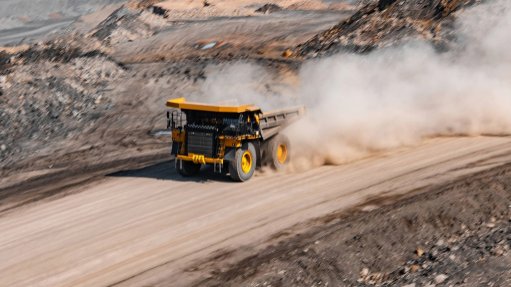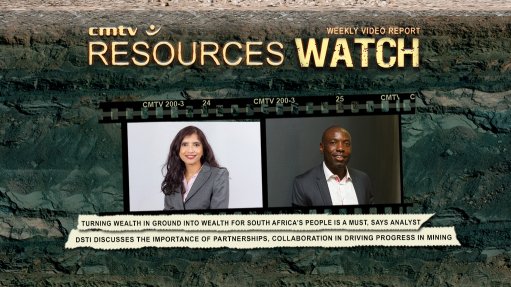Change as a Tradition – The Raw Materials Sector in Sustainable Transformation
This article has been supplied.
By: Jens-Peter Lux, Managing Director, DMT GROUP
The development and wealth of our society have always been connected to the availability and management of raw materials. They have a considerable influence on economic growth, employment, commerce, technological innovation and the well-being of societies. Although needs, technologies and processes change constantly, the fundamental relevance of the raw materials sector for society as a whole was, is and will remain undisputed. The sector is at the bottom of the supply chain and provides the foundations for the manufacture of goods and for services in the most varied sectors of industry. Its products are found in everyday items just as much as in cutting-edge research and in everything in between.
The growing world population, increasing prosperity and technological progress lead to a constantly growing demand for raw materials. They play a key role in economic development and are essential for high-tech applications, infrastructure, the construction sector, medical equipment and the most diverse industrial sectors, and therefore make a major contribution to economic growth. In particular, the development of next-generation technologies greatly depends on raw materials. They not only regularly help to cross technological frontiers but are essential for achieving the United Nations Sustainable Development Goals (SDGs). This means that we need raw materials just as much to reach climate protection goals and speed up the energy transition as we do for digital connectivity and securing competitiveness in high-tech industries.
Raw materials enable progress and, at the same time, their use is changed by progress. For example, electronic devices such as smartphones and laptops have increased demand for rare earths and other minerals, and advancing digitalisation is increasing it even further. On the other hand, coal, for example, played a major role in energy supply and the industrial revolution for a long time. Although we are currently in the process of making our energy supply completely CO2-neutral, we even depend on raw materials for that. The expansion and greater use of renewable energies, such as solar and wind power, has tremendously increased demand for certain raw materials, such as silicon. The move towards climate-friendly electric mobility is making lithium one of the key raw materials of the future. But the functions of raw materials such as gold, which played an important role in early civilisations, are changing. Alongside its continuing role as a means of exchange, a way of storing value and a material for craftsmanship, we now also need gold for high technologies, such as microchips, or for space travel.
The Raw Materials Sector as the Pioneer of Sustainable Transformation
The raw materials sector is closely linked to the great challenges and developments in society in general and the economy in particular. Even though many people do not yet associate it with sustainability, it is crucial for the success of the transformation to sustainability. Although this transformation is often symbolised by pictures of photovoltaic arrays and wind power plants, it is mines and other production sites that provide what’s needed for them to be built and operated.
However, the importance of the sector goes well beyond the energy transformation. Mining plays a key role in the provision of raw materials for innovative and digital technologies that make it possible in the first place for entire sectors to develop new methods, for example for more environmental protection and the circular economy, and to integrate other sustainable processes in their operations. These include materials for energy-efficient construction projects, electromobility and other green innovations. Without raw materials, there is no technological progress. And just as mining was the prerequisite for industrialisation, today it is the prerequisite for us being able to reconcile our prosperity with environmental and climate protection and carry it forward in the future.
It is undisputed that there were often scandals associated with mining projects in the past with respect to ecological and/or social matters, and that harmed the image of the sector as a whole. This is why we have to take responsibility and use the tremendous potential presented if a structural change towards more sustainability in the sector is to be successful. If sufficient account is taken of ecological, social and governance factors, what was once a risk can become an opportunity. Thanks to responsible mining and social initiatives, local communities can benefit from the economic opportunities and, at the same time, environmental impacts be minimised.
Leading Confidently – Raising Awareness of Mining
A transformation of this kind is important in our sector to do justice to the growing demands from society, but also to play our role in the transformation towards more sustainability responsibly. After all, whereas the raw materials that we supply are often hard or impossible to substitute and there are no alternatives, we can always further improve our own processes, from exploration to restoration. Only when we make our own processes more sustainable will we be in a position to confidently place ourselves as key players in sustainable transformation. And that is our ultimate goal so that we can secure our social licence to operate in the long term.
We have a good starting point. The relevance of security of raw materials supplies is more prominent on the public agenda than it has been for a very long time. Initiatives like the EU Critical Raw Materials Act underline the importance of a secured raw materials supply for the future viability of our society. The Act even created a legal framework designed to secure Europe’s access to critical raw materials, which are essential for industrial development, technological progress and achieving sustainability goals. It is right and important that many initiatives to secure the raw materials supply are currently being started at national and European level, but the image of the sector will have to change over society as a whole: mining is not a sector in decline, but rather one of the most important industries of the future. Acknowledging this is a job for politics and society, but we must create the conditions for this, by continually improving and communicating these improvements.
As an industry, we too must do our homework. We must explain our role better and, at the same time, work on designing our processes to minimise negative impacts on the environment or local communities. We must show how the technological progress of our sector has changed and how we are advancing sustainable transformation. The sustainable and responsible production and use of raw materials are decisive for ensuring long-term, positive impacts on social development. The goal for all of us should therefore be for the opportunities already available to be used as broadly as possible and, what’s more, continue to be further developed.
Public participation, the use of renewable energies and ever more efficient machinery, improvements to environmental and safety standards, the amount of resources used for researching and developing more efficient and more sustainable processes and, not least, encouraging transparency about it - all of this would have been inconceivable not too long ago and underlines the innovativeness of our sector.
The Dynamism of a Traditional Sector: Constant Change
It is precisely because our products are essential for the transformation that we can’t rest on our laurels but have to keep on developing further. We have always done this and will continue to do so. And just as the transformation is advancing, the traditional industry of mining is also moving. The progress that we have made should encourage us to go further. Although making the first move may entail a risk in the short term - there are clear advantages in the long term. Because only those who operate sustainably will ultimately keep their place on the market in the long term.
The rising demands of society are not only addressed to mining, but also to its customers. The further development of digital technologies will soon support us in creating transparent and trustworthy supply chains that enable companies to trace the origin of their raw materials and ensure that they are extracted under fair and sustainable conditions. Proof of this kind will be an advantage in business at first and will subsequently develop into a market requirement.
From an economic point of view, sustainability in mining means creating value in the long term and securing the profitability of mining activities without endangering future generations or economic resources. The transformation of the raw materials sector requires coordinated and joint action by governments, companies, civil society and international organisations to ensure the sustainable use of our natural resources, minimise the social and ecological impacts of mining and encourage fair development.
This can be experienced at the MiningForum. When our industry meets in Berlin every two years, we learn from each other and show how we can operate more efficiently, more sustainably and more safely by using the latest technologies. We come together here to discuss the best possible way to supply the raw materials that we need as a society. Together we find the best methods to identify and deal with the risks and opportunities that the current, turbulent times cause for our industry. This year’s Forum is therefore being held under the motto "For a sustainable future" – because as the importance of the sector for sustainable change grows, the importance of sustainability is growing for the sector. The progress, the findings and innovation that are presented at the MiningForum every two years should make us confident. Because they show that we can combine entrepreneurial wealth creation with social value added.
Article Enquiry
Email Article
Save Article
Feedback
To advertise email advertising@creamermedia.co.za or click here
Press Office
Announcements
What's On
Subscribe to improve your user experience...
Option 1 (equivalent of R125 a month):
Receive a weekly copy of Creamer Media's Engineering News & Mining Weekly magazine
(print copy for those in South Africa and e-magazine for those outside of South Africa)
Receive daily email newsletters
Access to full search results
Access archive of magazine back copies
Access to Projects in Progress
Access to ONE Research Report of your choice in PDF format
Option 2 (equivalent of R375 a month):
All benefits from Option 1
PLUS
Access to Creamer Media's Research Channel Africa for ALL Research Reports, in PDF format, on various industrial and mining sectors
including Electricity; Water; Energy Transition; Hydrogen; Roads, Rail and Ports; Coal; Gold; Platinum; Battery Metals; etc.
Already a subscriber?
Forgotten your password?
Receive weekly copy of Creamer Media's Engineering News & Mining Weekly magazine (print copy for those in South Africa and e-magazine for those outside of South Africa)
➕
Recieve daily email newsletters
➕
Access to full search results
➕
Access archive of magazine back copies
➕
Access to Projects in Progress
➕
Access to ONE Research Report of your choice in PDF format
RESEARCH CHANNEL AFRICA
R4500 (equivalent of R375 a month)
SUBSCRIBEAll benefits from Option 1
➕
Access to Creamer Media's Research Channel Africa for ALL Research Reports on various industrial and mining sectors, in PDF format, including on:
Electricity
➕
Water
➕
Energy Transition
➕
Hydrogen
➕
Roads, Rail and Ports
➕
Coal
➕
Gold
➕
Platinum
➕
Battery Metals
➕
etc.
Receive all benefits from Option 1 or Option 2 delivered to numerous people at your company
➕
Multiple User names and Passwords for simultaneous log-ins
➕
Intranet integration access to all in your organisation





















